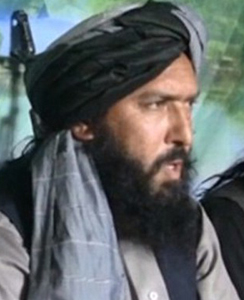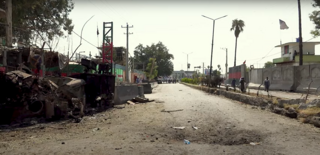
The Islamic Movement of Uzbekistan was a militant Islamist group formed in 1998 by Islamic ideologue Tahir Yuldashev and former Soviet paratrooper Juma Namangani; both ethnic Uzbeks from the Fergana Valley. Its original objective was to overthrow President Islam Karimov of Uzbekistan and create an Islamic state under Sharia; however, in subsequent years, it reinvented itself as an ally of Al-Qaeda. The group also maintained relations with Afghan Taliban in 1990s. However, later on, relations between the Afghan Taliban and the IMU started declining.
The mass media in Afghanistan is monitored by the Ministry of Information and Culture (MoIC), and includes broadcasting, digital and printing. It is mainly in Dari and Pashto, the official languages of the nation. It was reported in 2019 that Afghanistan had over 107 TV stations and 284 radio stations, including 100s of print media and over 1,800 online media outlets. After the return of the Islamic Emirate of Afghanistan (IEA) in 2021, there was a concern that the mass media will significantly decrease in the country. The number of digital media outlets is steadily increasing with the help of Facebook, Instagram, TikTok, Twitter, YouTube, and other such online platforms. IEA's spokesman Zabihullah Mujahid suggested that the media should be in line with Sharia and national interests.
Voice of Jihad was the title of a website, which claims to be one of the official websites of the Taliban. It mainly provides latest news about Afghanistan in Arabic, Dari, English, Pashto, and Urdu. After the Taliban restored the Islamic Emirate of Afghanistan, it was renamed the Official Voice of Afghanistan.

Since the 2001 fall of their national government in Afghanistan, Taliban propaganda has developed into a sophisticated public relations machine that is shaping perceptions in Afghanistan and abroad. Although polls show the movement remains unpopular, the insurgents have readily exploited a sense of growing alienation fostered by years of broken government promises, official corruption, and the rising death toll among civilians from airstrikes and other military actions. "The result is weakening public support for nation-building, even though few actively support the Taliban," says a report from the International Crisis Group, a think tank that monitors conflicts. An American official in Afghanistan agrees: "We cannot afford to be passive [communicators] any longer if we're going to turn this around."

The Islamic State (IS) had its core in Iraq and Syria from 2013 to 2017 and 2019 respectively, where the proto-state controlled significant swathes of urban, rural, and desert territory, mainly in the Mesopotamian region. Today the group controls scattered pockets of land in the area, as well as other minor territory or insurgent cells in other areas, notably Afghanistan, West Africa, the Sahara, Somalia, Mozambique, and the Democratic Republic of the Congo. As of 2023, large swathes of Mali have fallen under IS control.

The Islamic State – Khorasan Province is a regional branch of the Salafi jihadist group Islamic State (IS) active in South-Central Asia, primarily Afghanistan and Pakistan. ISIS–K seeks to destabilize and replace current governments within the historic Khorasan region with the goal of establishing a caliphate across South and Central Asia, governed under a strict interpretation of Islamic sharia law, which they plan to expand beyond the region.

Hafiz Saeed Khan, also known as Mullah Saeed Orakzai, Shaykh Hafidh Sa'id Khan, or Maulvi Saeed Khan, was an Islamic militant and emir for the militant group Islamic State – Khorasan Province (ISIS–K) from January 2015 until his death in July 2016. Prior to 2015, Khan fought alongside the Afghan Taliban against NATO forces in Afghanistan, joined the militant group Tehrik-e Taliban Pakistan (TTP) as a senior commander, and later swore allegiance to ISIS caliph Abu Bakr al-Baghdadi, established ISIS–K in Afghanistan as the province's first emir until his death in a reported American drone strike.
Abu ‘Umayr ‘Abd al-Hasib al-Logari or Abdul Haseeb Logari was a Pakistani Islamic militant who led the Islamic State – Khorasan Province from July 2016 until his death on 27 April 2017.
Abdul Rahman Ghaleb, known as Abu Sayed Bajauri or simply Abu Sayed, was a Pakistani terrorist who led the Islamic State – Khorasan Province (ISIS–K). Abu Sayed should not be confused with the similarly-named ISIS–K leader who succeeded him, Abu Saad Erhabi.

The Battle of Darzab was a major conflict between the Taliban and the Islamic State's Khorasan Province (ISIS–K) who fought each other over control of Jowzjan Province's Darzab District in Afghanistan. Following heavy clashes, ISIS–K was defeated, with most of the group's forces in Jowzjan Province killed or captured.

The Islamic State–Taliban conflict is an ongoing insurgency waged by the Islamic State – Khorasan Province (IS-KP) against the Taliban regime in Afghanistan. The conflict initially began when both operated as rival insurgent groups in Nangarhar; since the formation of the Taliban's state in 2021, IS-KP members have enacted a campaign of terrorism targeting both civilians and assassinating Taliban members using hit-and-run tactics. The group have also caused incidents and attacks across the border in Pakistan.

The Jalalabad prison break was a coordinated attack and prison break conducted by the Islamic State – Khorasan Province (ISIS–K) on 2 August 2020 which targeted Jalalabad Prison in the provincial capital of Nangarhar Province in eastern Afghanistan. The attack, which intended to free other members of ISIS–K previously incarcerated by the Afghan government, has been described by counterterrorism analysts as "a highly sophisticated [...] coordinated assault" and in 2023 as "one of [ISIS–K's] most sophisticated and ambitious attacks to date."

Amir Khan Muttaqi is a politician serving as the acting Minister of Foreign Affairs of the Islamic Emirate of Afghanistan since 7 September 2021. He was also a member of the Taliban negotiation team in the Qatar office.

Sanaullah Ghafari, better known under his nom de guerre, Shahab al-Muhajir is an Afghan militant who is serving as the Emir of the Islamic State's Khorasan Province (ISIS–K) since 2020.

Kunar offensive was a major offensive by Taliban forces against Islamic State in Kunar province which led to conquer of their territorial stronghold and death or surrender of most IS forces. Terror cells however remained active in the area.

The I'lam Foundation was a multi-language media center of the Islamic State that provides content in the languages of, English, French, Uzbek, Hindi, Arabic, Malayalam, Turkish, Pashto, Persian, Spanish, Indonesian, German, Bosnian, Hausa, Albanian, Tajik, Uyghur, Kurdish, Somali, Amharic, Swahili, Bengali, and Maldivian like the media center Al-Hayat Media Center.
On 12 December 2022, insurgents attacked a hotel popular with foreigners in Kabul, Afghanistan. At least 3 civilians were killed and 18 others, including foreigners, were reported to be injured. Islamic State – Khorasan Province claimed responsibility for the attack.
IS is known for its extensive and effective use of propaganda. It uses a version of the Muslim Black Standard flag and developed an emblem which has clear symbolic meaning in the Muslim world.

The Islamic State – Khorasan Province (ISIS–K) is a regional branch of the Islamic State terrorist group active in South-Central Asia, primarily Afghanistan. ISIS–K seeks to destabilize and overthrow existing governments of the historic Khorasan region to establish an Islamic caliphate under its strict, fundamentalist Islamist rule.

Mawlawi Aslam Farooqi, also referred to as Mullah Aslam Farooqi and Akhundzada Aslam Farooqi, and whose true name is Abdullah Orakzai, was a Pakistani Islamist jihadist militant, Pakistani Taliban and Sipah-e-Sahabah commander, and the fourth head (wali) of the Islamic State – Khorasan Province (ISIS–K).












